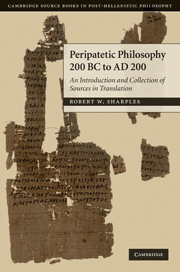Book contents
- Frontmatter
- Contents
- Preface
- Abbreviations
- Introduction
- Individuals
- Logic and ontology
- Ethics
- Physics
- Chapter 19 The nature of time and place
- Chapter 20 The eternity of the world
- Chapter 21 The heavens
- Chapter 22 God and providence
- Chapter 23 Fate, choice and what depends on us
- Chapter 24 Soul
- Chapter 25 Generation
- Chapter 26 Sensation
- Chapter 27 Intellect
- Bibliography
- Index of sources
- Index of passages cited
- Index of personal names (ancient)
- General index
Chapter 22 - God and providence
Published online by Cambridge University Press: 05 June 2012
- Frontmatter
- Contents
- Preface
- Abbreviations
- Introduction
- Individuals
- Logic and ontology
- Ethics
- Physics
- Chapter 19 The nature of time and place
- Chapter 20 The eternity of the world
- Chapter 21 The heavens
- Chapter 22 God and providence
- Chapter 23 Fate, choice and what depends on us
- Chapter 24 Soul
- Chapter 25 Generation
- Chapter 26 Sensation
- Chapter 27 Intellect
- Bibliography
- Index of sources
- Index of passages cited
- Index of personal names (ancient)
- General index
Summary
Cicero, On the Nature of the Gods 1.33
(1) Aristotle in the third book of his On Philosophy introduces great confusion, disagreeing with his teacher Plato: for now he attributes all divinity to intellect, now he says that the world itself is a god, now he puts some other [god] in charge of the world and assigns to him the role of ruling and preserving the movement of the world by a certain rolling back, then he says that the heat of the heaven is a god, not understanding that the heaven is a part of the world which he himself elsewhere has designated as a god. (2) But how could that divine awareness be preserved in such rapid motion? Where are all the gods [we speak of], if we count the heaven itself as a god? And when he wants god to be without a body, he deprives him of all awareness, and [so] of wisdom. Further, how can [god] move if he does not have a body, or how, if he is always moving himself, can he be peaceful and blessed?
Stobaeus, Selections 1.1.29b (35.5–6 Wachsmuth) = Aëtius 1.7.21 (Dox. p. 303.6–7) = Critolaus, fr. 16 Wehrli 1969b
Critolaus, and Diodorus of Tyre, [said that god is] an intellect from impassible aither.
- Type
- Chapter
- Information
- Peripatetic Philosophy, 200 BC to AD 200An Introduction and Collection of Sources in Translation, pp. 196 - 210Publisher: Cambridge University PressPrint publication year: 2010



